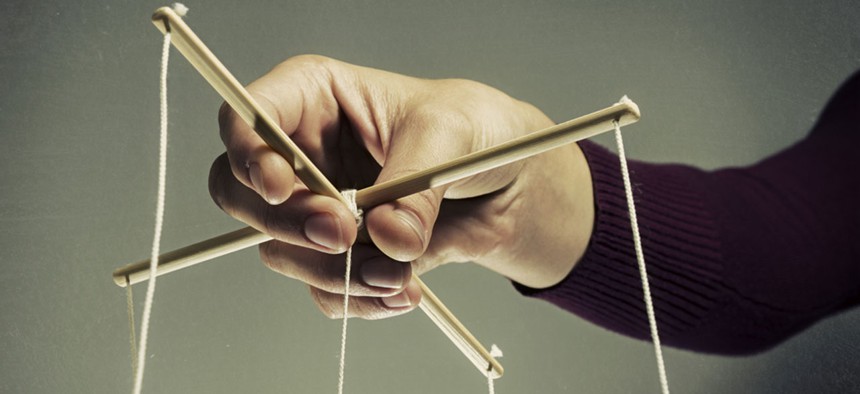
SvetaZi/Shutterstock.com
Psychology Suggests That Power Doesn’t Make People Bad— It Just Reveals Their True Natures
Power makes us feel free to be our authentic selves.
“When you’re a star, they let you do it,” Donald Trump boasts of sexually assaulting women in the recently leaked Access Hollywood tape. “You can do anything.”
Of course, the power that comes with celebrity does not—and should not—permit anyone to hurt other people. But Trump’s comments are in line with an essential finding of psychological research: The more power people get, the more freedom they feel they have to be their authentic selves, acting consistently with their goals and values. In other words, power isn’t inherently corrosive. It simply brings our true nature out into the open.
One study that I conducted with Serena Chen and Dacher Keltner, psychology professors at the the University of California, Berkeley, aptly illustrates this phenomenon. We asked some participants to think of a time they had power, and some participants to think of a time they had lacked it. This put them in a correspondingly powerful or powerless mindset.
Directly following this prompt, we asked participants what they are like around three important social groups they belong to—such as their friends, family, and co-workers.
When participants were primed to think of a time they lacked power, their personal characteristics fluctuated between groups. This pattern that suggests lacking power leads people to vary their personalities and behavior slightly across social settings, so as to accommodate the various goals and expectations of others.
By contrast, when participants had thought of a time they held power, they were more consistent in their traits across social groups. The freedom that comes with power allowed individuals to be the same person across contexts. A follow-up study using similar methods also found that powerful individuals reported feeling more authentic—more like their true self—than those momentarily made to think about lacking power.
The biggest implication of this sort of study is that having power allows people to freely express themselves in situations where others might more carefully consider how their behavior impacts, or even harms, others. This is fine if you have a leader who is inherently honest, caring, and compassionate. But it’s bad news if you happen to have a leader who’s naturally selfish, quick-tempered or morally bankrupt.
A study I conducted with Stéphane Côté, an organizational psychology professor at the University of Toronto, bears directly on this hypothesis. We measured the prosocial orientation of individuals—that is, their baseline tendency to be caring and compassionate towards others. Then we assessed how much power and autonomy these individuals had at their jobs.
We found that powerful people with a prosocial orientation scored higher on a test that measured their ability to accurately read emotions in facial expressions. Powerful people who were low in prosocial orientation, however, scored lower on the test. In sum, if you’re not naturally inclined to be compassionate, having power gives you license to attend less carefully to other people’s feelings.
The fact that power amplifies negative personality traits also has some direct implications for behavior. In a study by Katherine DeCelles, a professor of organizational behavior at the University of Toronto, people who cared less about morality were also more likely to break the rules at work—but only if they had power.
In the study, working adults reported higher levels of misbehavior at the workplace—such as clocking out early or taking longer than allowed breaks—specifically when they were more powerful and morality was less central to their identity. People who placed a high value on acting morally, however, were less likely to misbehave at work even if they had power.
More than a decade prior to this study, Chen and her colleagues conducted an experiment that found similar results. Participants were given power to make decisions or not in an experiment, during which they interacted with a partner who arrived to the laboratory late and appeared disheveled. Those in power with communal personalities—that is, people who are more trusting and agreeable in relationships—were more likely to help their distressed partner, even though that meant that they stayed longer to complete the study. People with power who were low in communality were less likely to help out.
Together, these findings suggest that power has a caustic effect on people with already questionable character because it gives them unfettered license to act, feel and treat others in ways that completely align with their own goals and interests. This psychological freedom can help explain, for example, the evolution of stock trader Ivan Boesky—the man who inspired the character of Gordon Gekko in the movie Wall Street. Early in his career, he profited legally from corporate takeovers. But as he rose in power, he graduated to brazen and illegal insider trading. Similarly, Diederik Stapel—a former professor of social psychology who committed widespread academic fraud—fabricated more and more data as his prestige and influence in his field increased.
And this science becomes particularly relevant as the public experiences daily revelations about Trump scandals past and present. Psychological research strongly suggests that we should care a great deal about our leaders’ personalities, separately from the policies they champion, because no position is prestigious or noble enough to make a person of questionable character behave themselves. In fact, one shudders at the sheer magnitude of transgressions that might be enabled by the power of a president Trump.






